ZMINA: Rebuilding - Theater director in Kherson: “When I see women going to the theatre, today, even though we’re playing in a shelter, they’re putting on dresses. This is the only opportunity they have in Kherson to wear dresses”
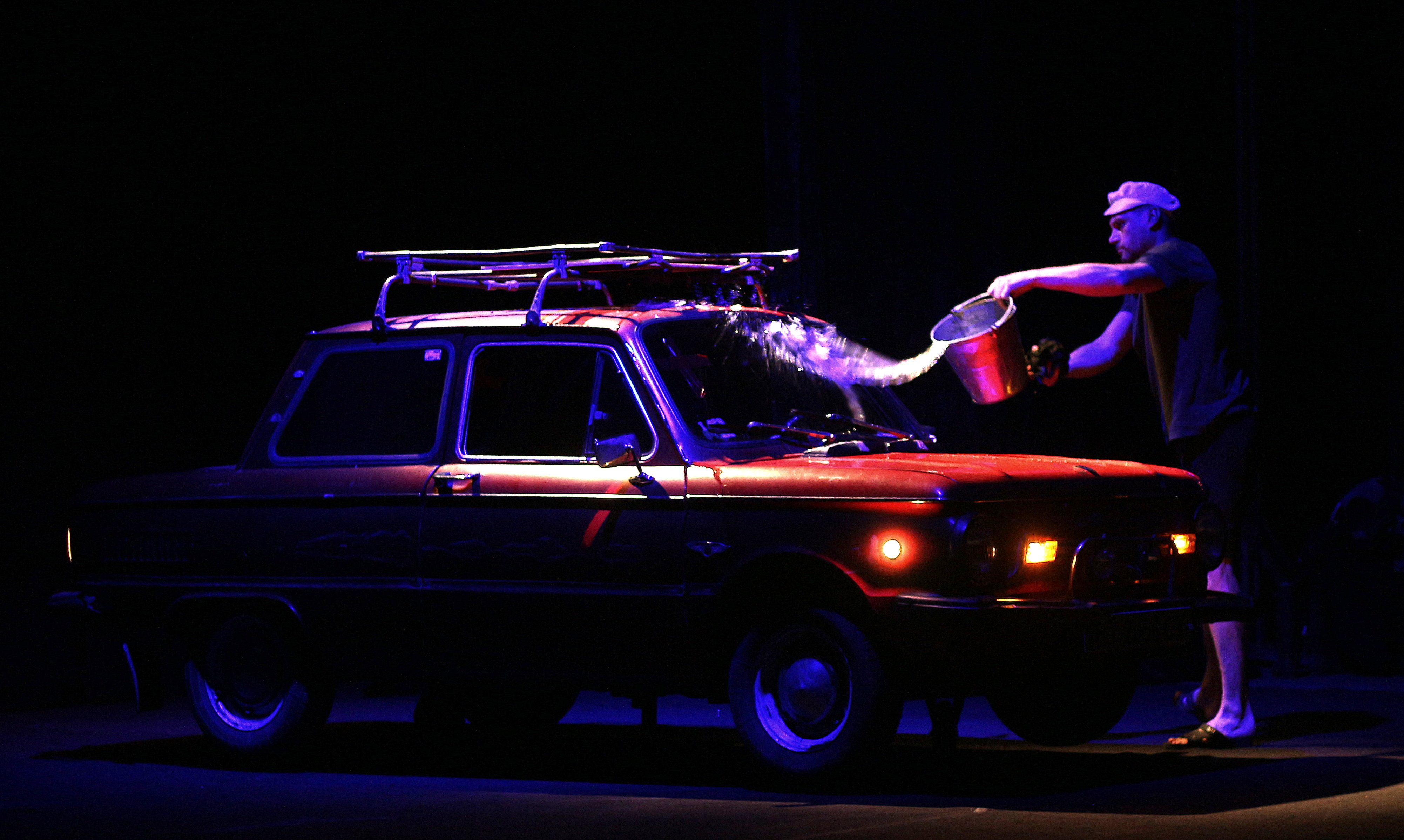
The theatre in Kherson (Ukraine) has been going through a difficult time since the beginning of the full-scale invasion. The city was under occupation, and now, even after the de-occupation, the theatre building is constantly under fire. Despite all this, the theatre continues to work, holding performances in different cities and travelling to other countries. We talked to the theatre's director Oleksandr Knyha about the theatre's work and the performance of The Carrier, which was supported by ZMINA: Rebuilding implemented by Trans Europe Halles, IZOLYATSIA (Ukraine) and Malý Berlín cultural center (Slovakia).
How did you come up with the idea to make this performance, how did it all start?
Well, look, we are Kherson people who survived the occupation and knew the price of losing everything. This subject is painful for us, so whenever we find interesting texts, we try to take them to other regions of Ukraine and tell them to those cities, to those people who, thank God, did not touch this occupation. That's why we have not only the play Carrier, but others as well.
We started to restore the theatre when we were already fleeing after the capture of Kherson, after the arrests, we escaped to the government-controlled territory of Ukraine. For example, I got to Kyiv and in Kyiv I started to resume the theatre work there, because the Russians were opening a Russian theatre here in Kherson based on our theatre, and we needed to prove that the theatre is not a building, but first and foremost people . And so, at the end of July, we staged the play ‘You Can't Stay’ at the Lesya Ukrainka National Theatre in Kyiv. Again, these were texts, our own stories of the occupation. Then, we were supported by the Ukrainian Cultural Foundation, and we travelled around Ukraine to tell this tragic story. When we came across the text ‘The Carrier,’ this story was very familiar to us because we know what carriers are, we know those people who took people out, who brought medicine, who did it out of their heart without money, and some even made money out of it.
Therefore, the story seems clear to us. However, we couldn't do this premiere in Kherson because we only work in shelters there and the stage venues there are small.
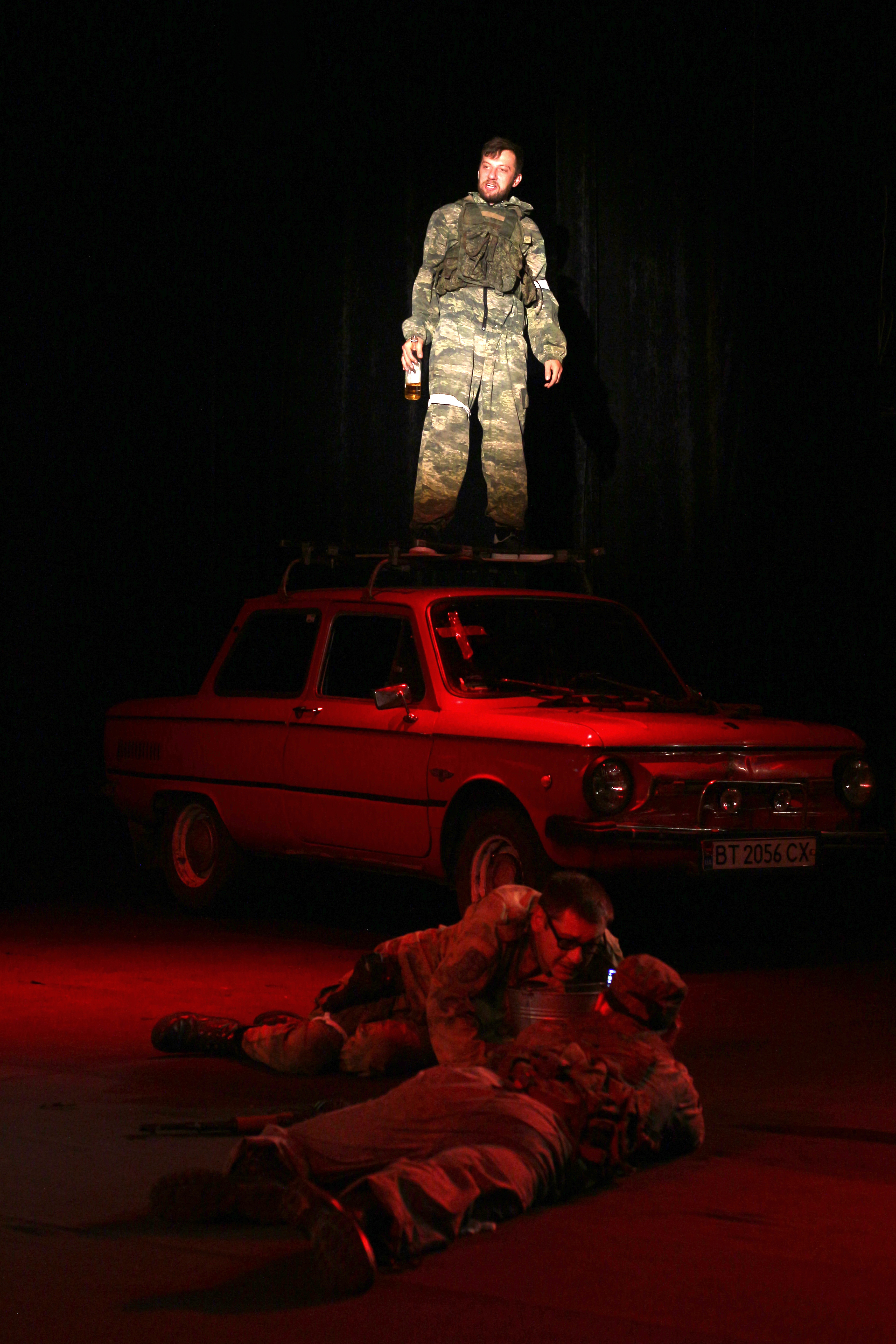
And we went to visit our friends at the Mykolaiv Theatre, which is nearby, 50 kilometres from Kherson. And there, on their big stage, we brought this project to life thanks to financial support from ZMINA, because we have no funds, and as soon as we find some money from donors, we make sure to do performances in order to restore the repertoire so that when we have the opportunity to return to Kherson and use all the stages, we will have a repertoire. Because before the war we had about 65 plays in our repertoire. Now we have managed to restore literally 5-6 performances from the old repertoire. Last year, however, we produced 19 premieres here in Kherson. Because the need is enormous, people come to our plays, and we are their only hope for a peaceful life, for a return, for some relaxation, for artistic therapy. That's why, you know, when I see women going to the theatre, today, even though we’re playing in a shelter, they’re putting on dresses. This is the only opportunity they have in Kherson to wear dresses. And this is also, you know, a story that pushes us to work, work, and work some more.
We perform almost every day in Kherson and work in Mykolaiv at the same time. However, we only perform in Kherson during the day because the theatre is located in a dangerous area. There’s constant shelling, and so at about 3 or 4 o'clock, the city centre dies out; there are simply no people here. That's why we play performances at 1 or 2 o’clock in the afternoon, and then we go in the evening and play in Mykolaiv. So we live with two cities and try to do as much as possible.
What exactly is this play Carrier about?
Several stories intersect there. A carrier who tries to help, goes through the checkpoints to Mykolaiv, tries to find some medicine there and then turns it into a business. This is one line because there were such people. Other people, on the contrary, are trying to resist in some way, to find a way out of the situation they are in. There are many intersecting storylines. The director also came up with a very interesting set, we found and bought a car - a red Zaporozhets. There was a real car on stage and a lot of the action took place there. It is one of the lines - these are young people who develop feelings for each other during the war and try to resist. Just as it really happened here, when Kherson residents went out with their bare hands and the Ukrainian flag towards the armed occupiers, the tanks. It was scary. But people here are free. They are used to behaving like this. They did not like it when the occupiers said that we are brothers.
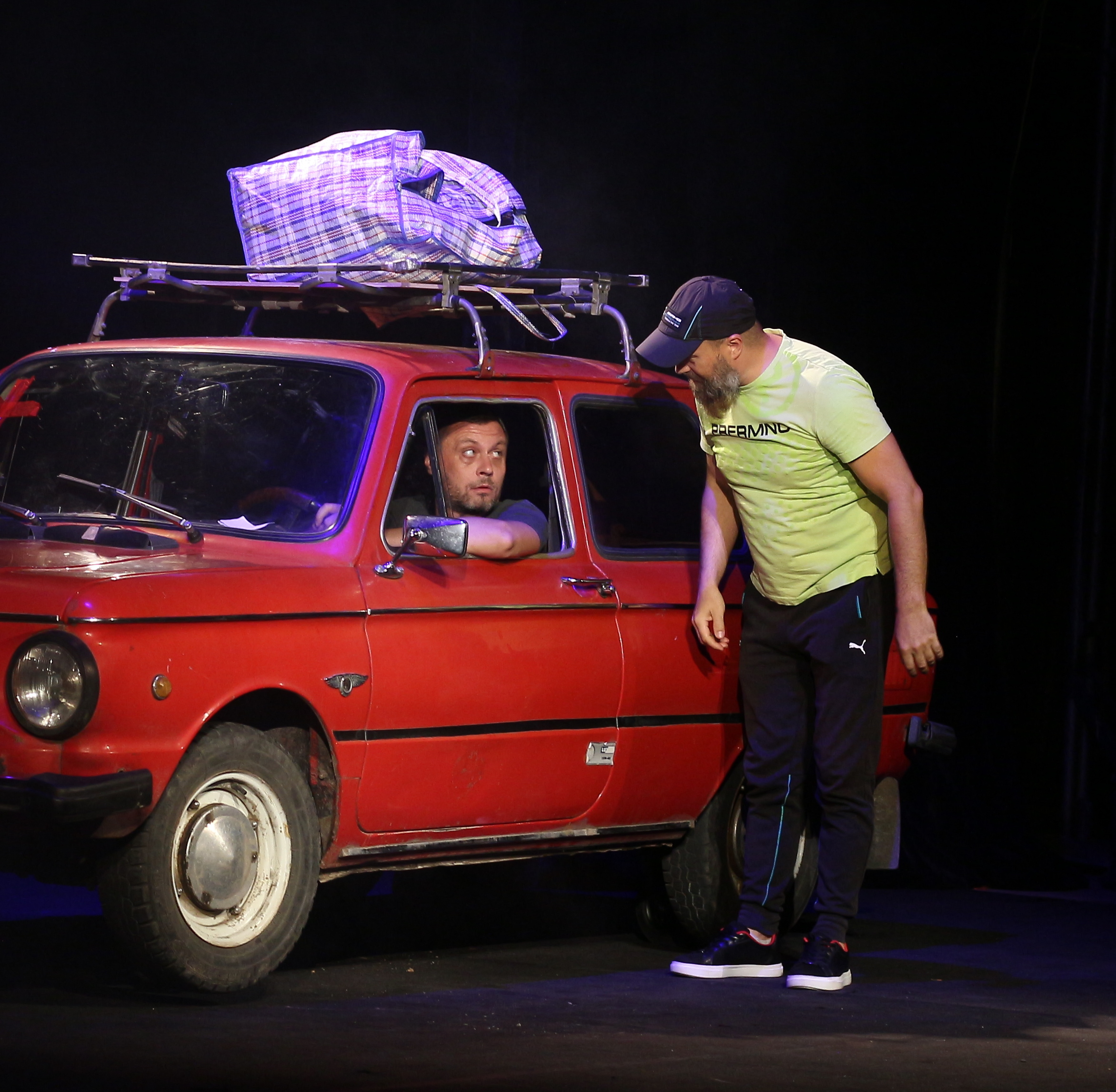
We explained to them that brothers come to visit with a cake, with some sweets, and you came with tanks. That's why this play has several such lines, several plot lines that intersect and show the maximum picture of what happened during the occupation.
How did the audience receive the performance? What were the audience's reactions?
You know, they were very well received. There were a lot of Kherson residents at the premiere, because there are nearly 30,000 Kherson residents in Mykolaiv today who cannot come to Kherson for one reason or another: because of the shelling, because their homes have been destroyed, and they are forced to stay there. So for them, every phrase is a painful experience, they cry. There were funny things in the play too, so people laugh and cry. And those people who, thank God, did not find themselves in a similar situation, they also begin to react under the influence of art. And that is the most important thing. Because people are wired in such a way that no matter how much you tell them that someone is going through a hard time, if they haven't gone through this experience themselves, they will never understand.
I'll give you a small example. In 2014, seven employees of the Luhansk Theatre came to our theatre. They were employees, artists of the orchestra with Artem Filenko who is a conductor. And so we helped them, we hired them here. But to understand what it's like when you lose everything is only a personal experience. I am 66 years old, I had a big family, I have five children, I have four grandchildren, I had a house in Oleshky, my children had a business, and at one point we became refugees. We fled our home with just our slippers and a suitcase. And that is exactly what is in the play. And when you convey this to people through emotion, they begin to understand how terrible this situation is. And God forbid that it should happen again. That's why we try to tell people and show them.
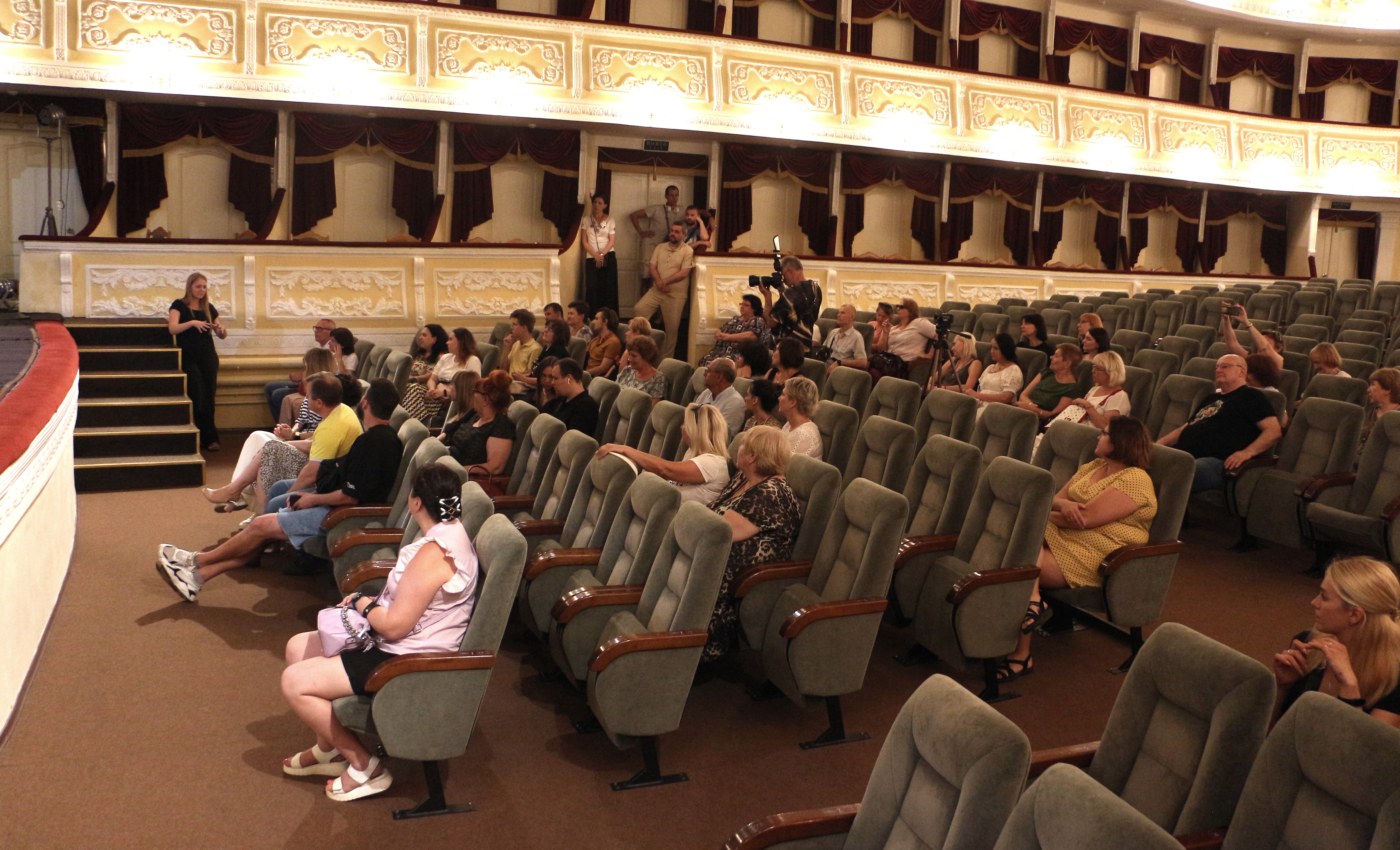
Could you tell us what the fate of the play is now? Do you continue to perform it? Perhaps, where did you perform it?
We performed it only at the Mykolaiv Theatre, because, as I said, the set is quite heavy. We planned trips, we planned tours, but there was no financial support, we couldn't do everything. And then the actor who played the main role went to war.
And now the performance is on hold. We want to resume it, but we have almost no male actors. Today I have only four male actors in my theatre. The cast is more female, because several actors are fighting at the front today, and some have already died.
That's why we’ve put it on hold for now, but we really want to resume it and bring it to Kherson. We are even slowly moving the set from Mykolaiv to Kherson so that we can perform it as soon as possible. And not just once.
What does your work look like in the current situation?
Well, just so you understand, we have a huge theatre, we have five stages, a main stage with 700 seats, a cafe stage with 160 seats, a covered stage with 160 seats, a hold stage with 85 seats, and an art hub with 90 seats. Today we work only with the hold stage and the art hub. The art hub hosts mainly music programmes, and we managed to gather part of an orchestra.
Artem Filenko, our chief conductor, who was a refugee from Luhansk in 2014, has now assembled the orchestra, and we have released a large number of musical and therapeutic programmes on Ukrainian music.
And the hold stage works mainly with one-man shows. However, we have just released a play called The Station, with the support of the German government, before the New Year. It's a woman's story, it's not about the war anymore, but it's called ‘Station’ or ‘Desire Schedule’. There are three actresses playing there, and we still only play in the shelter. Because it's a pretty decent venue, but you can't put on a big performance there anyway.
For your understanding, out of 300 windows in our theatre, only 5 are still intact today, the rest are smashed. The shells hit the theatre on the right and left, and the service part, the windows were smashed, we covered them with plywood and continued working. And we are doing the same thing now.
Now the city has built a lot of shelters in other parts of the city, and realising that people are often afraid to come to us, we go to them. But a lot of them already know and come here all the time.
We have already established such a systematic work, we even sell small tickets for only 100 hryvnias, but in fact, all our performances are sold out, and people come for them, it is the only hope and opportunity to touch and believe that victory will come and peaceful life will come.
And when we go to the shelters in the neighbourhoods, a lot of people come to the shelters when we arrive, and we also try to establish this systematic work.
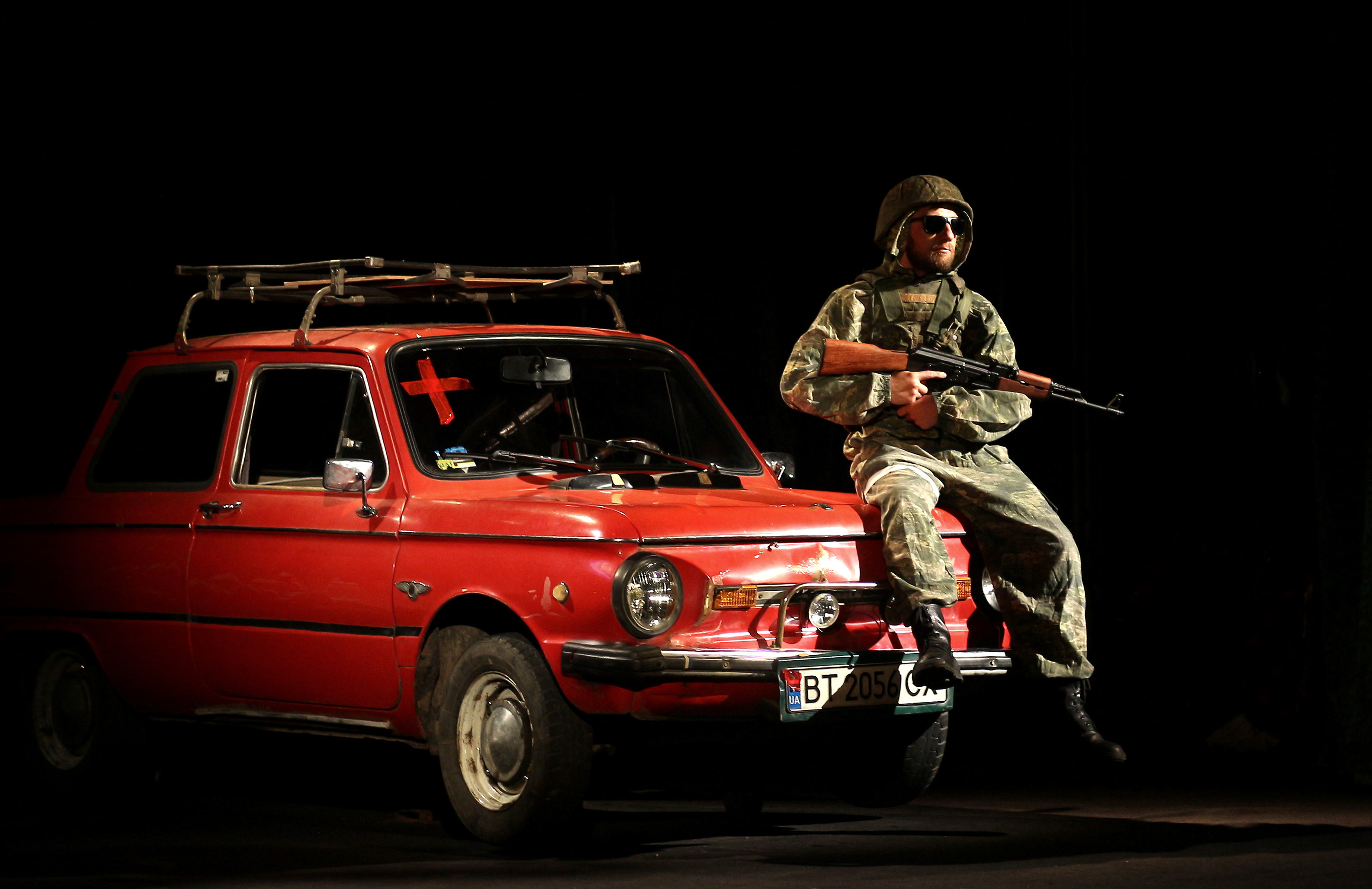
That is, once a week we go outside the theatre, which is difficult because we need transport, we need to fill the car, and it's difficult even today because, as I said, a ticket costs 100 hryvnias, and we are constantly looking for funds from some donors, from foundations. For example, USAID helped us, and today USAID is closed here, there is no help, and we also feel it. And we started travelling since the New Year, and we have taken it as our motto to serve the de-occupied villages, because the situation in the villages there is catastrophic. Schools and cultural centres have been destroyed. In some towns, we have now built underground shelters in kindergartens and under schools, and we are starting to work there. Because just imagine, children today, especially in the villages, and in Kherson in particular, have had no school, no kindergartens, no socialisation for three years. And since the liberation of Kherson, in a few days we went to the theatre and started working. It took us a week to wash and clean it. We also found the equipment that hadn't been stolen yet, and took some things from home. Then, as I said, USAID helped us restore it all, because the theatre was heavily robbed. And we started working.
In 2022, on New Year's Day, St Nicholas Day, we received 1700 children in the theatre, in the bomb shelter. We didn't even know that there were so many of them in the city at that time. And we saw how not childish these children's eyes were, because they had been hiding from the occupiers for nine months, because, you know, Russians took our children away, forced their parents to take them to a Russian school and so on. And in the village, it was a disaster.
We went to the village, we've already had several visits, and the children there don't know what it means to hold hands, because they've been at home for three years, the school is online, and nothing happens in the village. They don't see other children. By the way, parents here in Kherson thank us for showing their children other children.
Could you please tell us how people can support you?
We are grateful for any help, and we have launched the Ticket to Kherson campaign across Ukraine. We have sent out QR codes to our colleagues. A person who comes, for example, to buy a ticket to a theatre in Kyiv can support our theatre for 100 hryvnias. And before the New Year, we have already sold about 2000 tickets. With this money we can buy a battery for a microphone or something else. Of course, we need a resource base in order to continue to producing performances. That's why we’re always looking for funds. We are currently trying to get some for the production of the play and for travelling around Ukraine. So any help is welcome.
I am flying to Germany on 13 March. The city of Kiel has become a twin city of Kherson. I will meet there with colleagues and work there. We have one of the biggestfestivals in Ukraine, Melpomena Tavriya, and it did not stop even during the war, we held it even in 2022, although it took place not in Kherson, but all over the world.
By the way, in 2023 we were in Slovakia with one of our plays. We were very impressed with the receptions, the audience, despite everything that is happening at the political level and with the country's leadership, people received us very well.
Author: Anna Siedykh
ZMINA: Rebuilding is a project co-funded by the EU Creative Europe Programme under a dedicated call for proposals to support Ukrainian displaced people and the Ukrainian Cultural and Creative Sectors. The project is a cooperation between IZOLYATSIA (UA), Trans Europe Halles (SE) and Malý Berlín (SK).